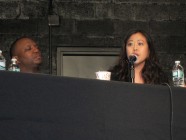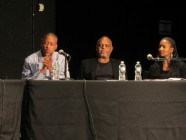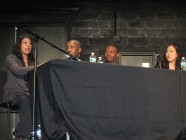On Sunday, February 23rd I had the privilege of speaking at an event in New York City with legacy civil rights leaders, like Student Non-violent Coordinating Committee (SNCC) and Freedom Summer founder Bob Moses and playwright John O-Neal. The event, “America at the Turning Point” was a daylong event of conversations sparked by the new play “All the Way” starring Bryan Cranston (from “Breaking Bad”) who plays President Lyndon B. Johnson (LBJ). The play is about LBJ’s role in the passing of the Civil Rights Act of 1964, 50 years ago.
I think it’s fair to say that most of us in the progressive community are extremely critical of the watered down 1964 version of the Civil Rights bill, and the role LBJ played as he carefully negotiated between conservative democrats who were segregationists, (Dixiecrats) and Republicans. I was glad to see that the play was also critical of LBJ’s motivation behind pushing this legislation through which was really to get re-elected.
The weekend included powerful panels with organizers like Bob Moses, Maisha Moses and Albert Sykes of Media Action Grassroots (MAG-Net) member Young People’s Project; filmmaker Stanley Nelson; Rinku Sen of Colorlines; Soffiyah Elijah of Correction Association of New York; Crystal Mattison of Institute for Democractic Education in America; Mia Henry of Chicago Freedom Schools, Andi Perez of Youth United for Change Philly and others.
I was asked to speak about the intersection between civil rights and media justice, here’s an excerpt of my presentation:
“The media justice movement was borne out of the civil rights movement in the South, specifically Jackson, Mississippi. Fifty years ago civil rights activists in Jackson took on the treatment of African Americans on mainstream television. There was a direct correlation between the racism and bigotry they were fighting on the streets and what they saw when they turned on their televisions in their living room. The same power structures that were opposing civil rights were the same ones that controlled the media system. When the Federal Communications Commission (FCC) rejected their petition they brought it to the federal court where they won a precedent setting case.
In Atlanta during the late 1950’s a black-owned low power community radio station played a key role in broadcasting messages from Dr. Martin Luther King. The offices of the Southern Christian Leadership Conference (SCLC) were directly below the station. Dr. King would take his broomstick and tap on the ceiling when he wanted to deliver a message on the radio. The civil rights movement always understood the impacts of media justice and telling our own stories and not just relying on the corporate biased media.
We see that the issues of today are similar to those from 50 years ago. Once again Voting Rights is being attacked and right wing backed “Stand Your Ground Laws” allowed Trayvon Martin’s murder to walk off scot-free. Those lobbying forces and corporations are part of the powerful right-wing lobbying force, the American Legislative Exchange Council (ALEC). Telecommunication and media corporations like Comcast and Verizon are big supporters of ALEC who are also are the ones undermining our public interest. Verizon is the main force behind the new court order that would eliminate an Open Internet also known as net neutrality and Comcast is proposing to merge with Time Warner Cable which would be bad for media diversity and consumer rights. These are the same 5 corporations that control 90% of what we watch, hear and see. They are controlling not only the content but also the pipeline of information today. ”
The Legacy of Freedom Summer
This year marks the 50th anniversary of Freedom Summer which was a campaign organized by Council of Federated Organizations (COFO), a coalition of the Mississippi branches of the four major civil rights organizations (SNCC, CORE, NAACP and SCLC) and led by Bob Moses launched in June 1964 to put an end to the system of rigid segregation. The civil rights workers and the summer volunteers successfully challenged the denial by the state of Mississippi to keep Blacks from voting, getting a decent education, and holding elected offices. The project set up dozens of Freedom Schools, Freedom Houses, and community centers in small towns throughout Mississippi to aid the local black population.
To celebrate Freedom Summer, Jackson, Mississippi will be hosting a national convening from June 25th to 29th both to recognize the accomplishments and those who worked for changes to the politically segregated Mississippi and to discuss how to continue the struggle toward Mississippi reaching its full potential for gaining equal rights for all. Jackson is also home to Mayor Chokwe Lumumba, who won an election on a progressive people’s agenda platform.
To learn more please tune into tomorrow’s, Wed. February 26th’s Digital Dialogue call at 10am PST/1pm EST, “The Fight for Media Justice and The State of Black America”. Young Peoples Project’s Albert Sykes will be on to talk about this historical convening in Jackson.







